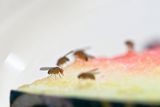Science
Fruit Flies Reveal How Nutritional Needs Shape Cravings

Research from the Champalimaud Centre in Portugal has uncovered how the brain transforms internal nutritional needs into focused cravings. This study highlights how fruit flies, when deprived of essential nutrients, display a heightened sensitivity to specific scents, particularly those associated with microbial food sources. The findings emphasize the remarkable adaptability of the brain in response to dietary deficiencies.
To investigate this phenomenon, researchers focused on essential amino acids, which are vital protein building blocks that animals must obtain from their diet. Even the absence of a single amino acid can disrupt the balance within the body, slowing metabolism and triggering the brain to seek out protein-rich foods. In the study, fruit flies were provided with controlled diets that lacked one of the ten essential amino acids, allowing scientists to analyze the genetic responses activated in the flies’ brains.
Each type of amino acid deficiency left a unique genetic imprint, yet certain reactions were consistent across all cases. Notably, two smell-related genes—Or92a and Ir76a—were universally activated whenever an amino acid was missing. This indicates a shared molecular pathway that links nutritional deficits to changes in sensory perception.
The research illuminated how hunger can reshape behaviors. The Or92a receptor is responsible for detecting diacetyl, a compound released by fermenting yeast, which is a primary protein source for the flies. When this receptor was disabled, the fruit flies could still locate yeast, but their consumption decreased. This suggests that smell plays a critical role not just in food detection but also in gauging its desirability.
The second receptor, Ir76a, responds to phenethylamine (PEA), a molecule produced by bacteria that ferment foods like cheese and chocolate. “That’s when things clicked,” said Sílvia Henriques, the study’s co-first author. “The flies weren’t being attracted to the chocolate itself—they were responding to the bacteria growing in those foods. And those bacteria are also natural residents of the fly microbiome.”
When the nutrient-deprived flies encountered live strains of Lactobacillus and Acetobacter—microbes involved in fermentation—their neurons exhibited increased activity, and they fed with enthusiasm. In contrast, dead bacteria did not generate the same interest. “This was the most surprising finding,” added Gili Ezra-Nevo, the study’s first author. “It showed that the flies’ sense of smell was literally tuned to detect bacteria, and that this tuning depended on their internal nutritional state.”
By modifying their sensory perception, the flies were not merely searching for food; they were actively seeking out microbial partners that could aid in their recovery from nutrient deficiencies. This research contributes to a broader understanding of how internal conditions can reshape sensory experiences.
The implications of this study extend beyond fruit flies, prompting valuable insights into human appetite and nutritional behaviors. It raises important questions about how our internal states can influence what we perceive in our environment. The brain, as demonstrated in the study, is not merely reactive to hunger signals; it actively rewires its sensory mechanisms to better navigate the world.
This research underscores the dynamic relationship between body and brain, illustrating that the perception of need is not static but rather adaptable. The findings invite further exploration into how similar mechanisms may operate in other animals, including humans, as they navigate their nutritional landscapes.
-

 Lifestyle3 months ago
Lifestyle3 months agoLibraries Challenge Rising E-Book Costs Amid Growing Demand
-

 Sports3 months ago
Sports3 months agoTyreek Hill Responds to Tua Tagovailoa’s Comments on Team Dynamics
-

 Sports3 months ago
Sports3 months agoLiverpool Secures Agreement to Sign Young Striker Will Wright
-

 Lifestyle3 months ago
Lifestyle3 months agoSave Your Split Tomatoes: Expert Tips for Gardeners
-

 Lifestyle3 months ago
Lifestyle3 months agoPrincess Beatrice’s Daughter Athena Joins Siblings at London Parade
-

 World3 months ago
World3 months agoWinter Storms Lash New South Wales with Snow, Flood Risks
-

 Science3 months ago
Science3 months agoTrump Administration Moves to Repeal Key Climate Regulation
-

 Business3 months ago
Business3 months agoSoFi Technologies Shares Slip 2% Following Insider Stock Sale
-

 Science2 months ago
Science2 months agoSan Francisco Hosts Unique Contest to Identify “Performative Males”
-

 Science3 months ago
Science3 months agoNew Tool Reveals Link Between Horse Coat Condition and Parasites
-

 Sports3 months ago
Sports3 months agoElon Musk Sculpture Travels From Utah to Yosemite National Park
-

 Science3 months ago
Science3 months agoNew Study Confirms Humans Transported Stonehenge Bluestones









